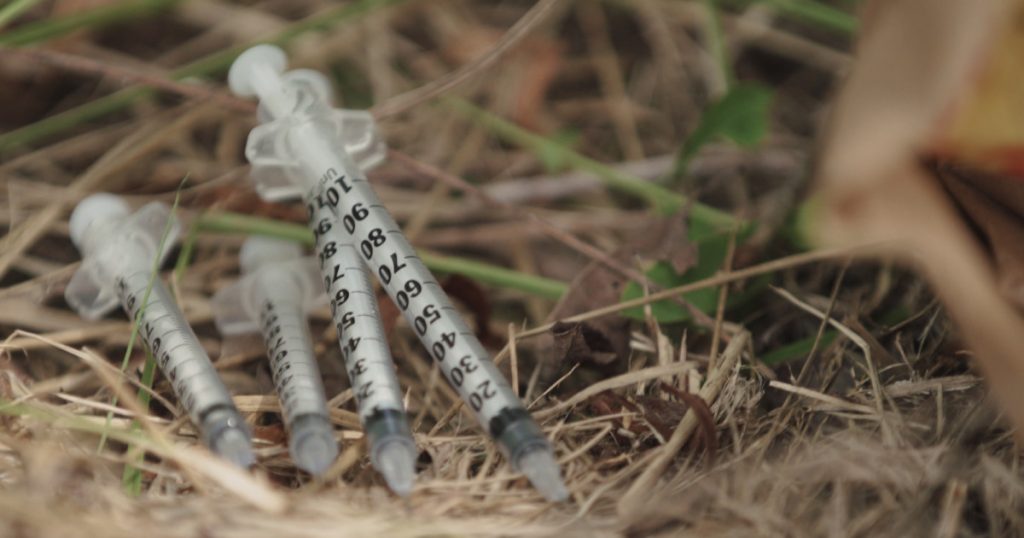“Don’t Forget About Me, Okay?”
Looking for news you can trust?Subscribe to our free newsletters.
Julia Lurie didn’t tell her parents that she was looking for drug dealers until afterward. She had been reporting on the opioid epidemic for nearly a year by this point, and she’d just spent a chunk of time in Baltimore and surrounding suburban and rural communities to understand how police were going about the Sisyphean work of fighting the spread of opioids. (You can read and watch her investigation here, with videos by Mark Helenowski.)
At MoJo, we had decided to go deep on this beat after the 2016 election, when it became clear that the map of counties voting for Donald Trump looked a lot like the map of communities most affected by the opioid epidemic. Counties with the highest rates of “deaths of despair” (suicide, alcohol, and drugs) also lit up with support for Trump. These were, one researcher pointed out, not necessarily the poorest places in America, but they were suffused with a toxic combination of anger and hopelessness—places where the current generation was inevitably worse off than the one before it.
Julia had followed police as they broke down doors in trailer parks; met moms who lived and dealt drugs out of their beat-up Mercury sedan; gathered the stories of social workers who broke down at finding lonely babies in the homes of overdosed parents. She had compiled statistics, dug through documents, and interviewed researchers. But the one thing she had not done was talk to the street-level drug dealers who are a critical part of the spread of the epidemic.
So, on a Saturday morning, Julia and Mark set off for a block that they’d heard was an open-air drug market. They gently approached people, one by one, until they found a pair of guys who were happy to talk: Doc and Dre. Both had grown up surrounded by drugs; both had cycled between recovery and relapse. Doc was 30, and he dealt drugs to support his family—ballet-loving daughter, football-obsessed son—in the suburbs.
Doc told me he knows how he appears to an outsider: “‘Look at that guy. Gold teeth, pants hanging off his ass.’ You look at us like we’re some kind of monster. Well, look at my school system. If you’re not going to educate me, where am I gonna work?”
Dre said he had recently gone through a job training program in Pennsylvania.
He raved about the peacefulness of the countryside, the lack of violence and drugs—but had come back to Baltimore to take care of his mom. Now he had a job at a supermarket and a girlfriend who wasn’t into drugs. For the moment, life was good. “I didn’t wanna be out here homeless where just all I wanted to think about was getting high.”
A couple of months later, as Julia wrapped up her reporting, she checked in with Doc and Dre again. Doc’s phone kept giving a busy signal, but Dre answered his. Doc had been shot and killed, he told her, just a block from where they’d spoken. Dre hadn’t been able to bring himself to go to his friend’s funeral.
When we spoke a week later, Dre’s words were slurred. He stopped midsentence to start humming. He’d just popped a couple Percocets, he admitted—my call woke him up from nodding off in the bathroom. “I can’t say I got an excuse,” he said, “but after [Doc] passed away, I’ve been doing it more and more.” This was the same guy…who had worked so hard to turn his life around. Now it seemed like he was careening off a ledge. Before we hung up, as if he were reading my mind, he said, “Don’t forget about me, okay?”
It’s gut-wrenching to hear voices like Doc and Dre’s, and the voices of the cops, social workers, parents, children, teachers, and countless others who are victimized by this epidemic. And it’s important to document them, so that we can grapple with what this epidemic really means—and why it exists. Because there are reasons it’s as bad as it is, and they are not simply the despair or bad choices of individual people. Politicians failed to take the problem seriously and even now are playing cynical games with it. Pharmaceutical companies for years bet they could make enormous profits by pushing opioid prescriptions and ignored or buried the warnings.
But these facts are still not nearly widely enough known—in part because almost no journalists report on this issue full time, as Julia does. There have been amazing investigations over the years, from the Washington Post to the Milwaukee Journal-Sentinel, on Big Pharma’s role in the crisis and the devastation in local communities. But today, most newsrooms, strapped for resources and increasingly desperate for advertising, can’t afford to put someone on a tough, time-consuming beat like this. (David Armstrong at STAT and German Lopez at Vox are two of just a handful of exceptions.) That’s why you get multiple versions of the same scary number or voyeuristic overdose photo, but not the ongoing shoe-leather work that can help us find real insight.
Yet readers like you are hungry for this kind of reporting—and that interest cuts across political, cultural, and geographic boundaries. Here’s an email Julia received recently, in response to her story about how the child-protection system is being overwhelmed by children whose parents are struggling with or dying from addiction:
I am a Christian conservative republican. I live in Ohio. I cannot thank you enough for your work on the opioid crisis. I cried after reading about the children in your story. It has really stuck with me all evening. I have never emailed the writer of anything I have read online. But your story has really touched me.
I have to be honest, I am jaded. Sometimes, quite judgmental…We may have different views on politics or how to fix this problem. But I would hope that we can all come together to help these children who are, by far, the biggest victims in the opioid crisis. I would give money, resources and support to anything that has to do with helping children. They deserve to have our support no matter what. Much appreciation for you and your work!!
That was just one of many notes and phone calls Julia has received. Her reporting is making the rounds in law enforcement, medical, and legal circles. And every day she comes to work, she digs deeper—reading scientific papers, making calls, traveling to communities too often forgotten.
All that is possible because of your support. The fact that readers, via subscriptions and donations, make up two-thirds of our budget is why we can put Julia full time on a beat like this. It’s why we can have editors, fact-checkers, and even a documentary filmmaker like Mark work for weeks or months on a single investigation—rather than stick them on the fluff topic du jour to please advertisers.
For that, we thank you. Because the only way our society is ever going to grapple with an issue like this is if we open our eyes to it and start working on solutions. In Texas, a judge started a task force on opioids inspired by Julia’s work. In Alabama, lawyers showed her reporting to policymakers considering suing pharmaceutical companies. Multiply those moments by hundreds or thousands, and change begins to take shape.





